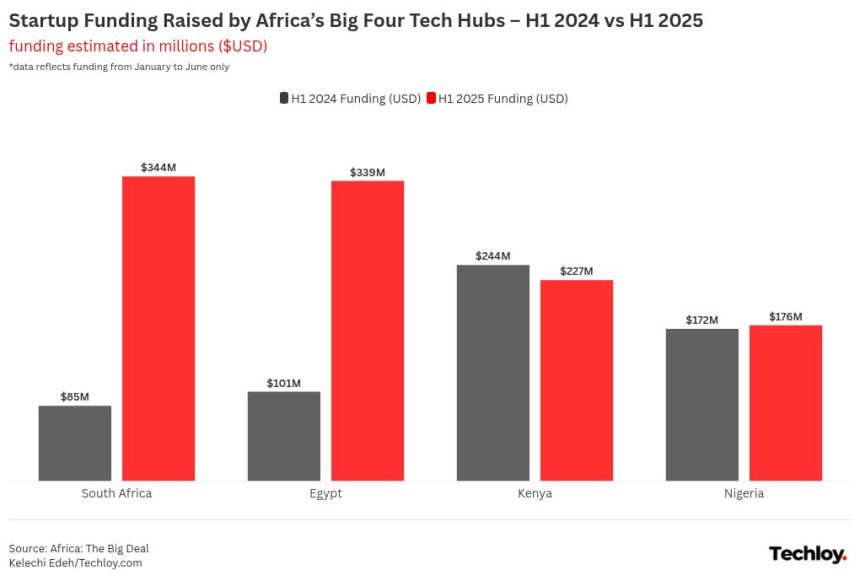Not long ago, Nigeria was the uncontested epicentre of Africa’s startup boom. In the funding wave of 2021 and 2022, it routinely topped charts, pulled the largest deals, and set the tone for the continent’s tech narrative.
But by the first half of 2025, that glow has dimmed. According to Africa: The Big Deal, Nigerian startups raised just $176 million in disclosed deals above $100k — their weakest half-year showing since H2 2020. It wasn’t just a slip in the rankings. It was a return to the bottom of the Big Four, behind South Africa ($344M), Egypt ($339M), and Kenya ($227M), for the first time in five years.
Yet funding totals only tell part of the story.
Nigeria still matched Egypt for the highest number of $100k+ raises (42 each) and tied for second in $1M+ deals (21 ventures each). The volume is there; what’s missing is scale. None of the Nigerian deals cracked the $60 million mark, while South Africa and Egypt each had at least three mega-rounds powering their surge.
The country’s three biggest deals, LemFi’s $53M Series B, OmniRetail’s $20M Series A, and Arnergy’s $18M Series B, hint at resilience in core sectors like fintech, retail, and energy. But even stacked together, they barely edge out Egypt’s single largest deal: Nawy’s $75M raise, which combined equity and debt to deliver Africa’s biggest-ever proptech round.
South Africa, meanwhile, didn’t just reclaim the top spot but also delivered its strongest half-year since H1 2023. It led the continent in $1M+ deals (26) and pulled off the continent’s only nine-figure round so far this year with hearX’s $100M merger. Kenya also returned to form with major energy raises like Burn Manufacturing’s $85M and PowerGen’s $55M, despite logging its lowest H1 tally since 2021.
CHART: African startup funding has crossed the $1 billion-mark for 2025
Funding slowed down slightly in May, but not enough to derail the momentum.

So, what’s happening in Nigeria?
Some of it reflects a broader cooling off. The mega-fintech raises that once defined the ecosystem are less frequent. Valuations have recalibrated. Investors are writing fewer blank cheques.
But the fundamentals aren’t broken; they’re just in wait mode. Reports suggest PalmPay may be lining up a $100M+ round, while Moove is rumoured to be chasing $300M in equity and $1.2B in debt. If either closes in H2, Nigeria’s numbers could swing dramatically.
For now, though, Nigeria feels like a market holding its breath — still active, still influential, but waiting for its next funding headline to land.






